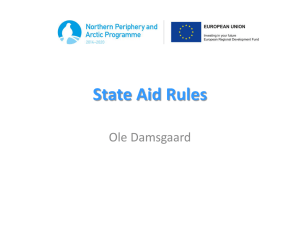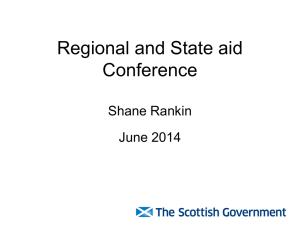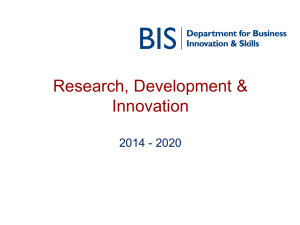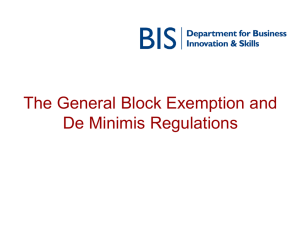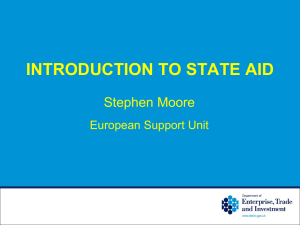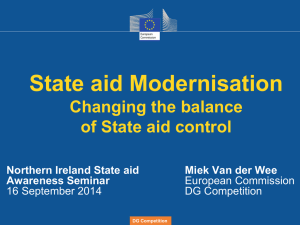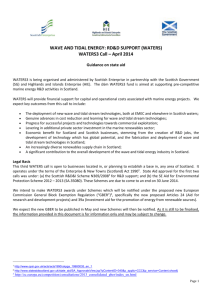Risk finance
advertisement
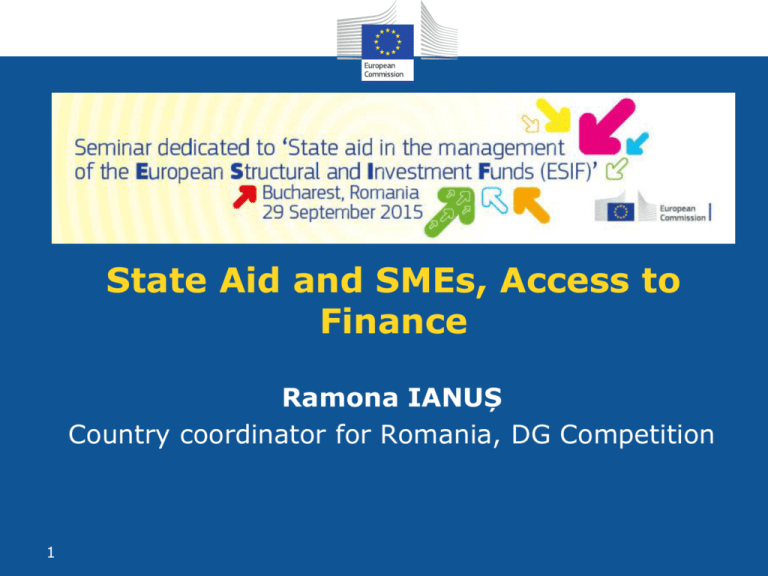
State Aid and SMEs, Access to Finance Ramona IANUȘ Country coordinator for Romania, DG Competition 1 Possibilities to ensure access to finance for SMEs 1. Market-conform access to finance measures = no State aid A. Equity – pari passu B. Loans – Reference Rate Communication C. Guarantees – Guarantee Notice 2. De minimis 1. Risk capital (equity injection 200 000 EUR) 2. Subsidised loans amounting to max 1 mio EUR 3. Subsidised guarantees for loan of 1.5 mio EUR 3. General Block Exemption Regulation = compatible aid & no notification 1. 2. General SME access to finance: 1. Risk finance aid (equity, loans, guarantees, fiscal advantages) 2. Start-up aid 3. Aid for alternative trading platforms 4. Aid for scouting costs 2 Access to finance for specific objectives: e.g. Urban development aid; Energy efficiency Definition of SME • For De minimis: only de jure control of linked companies • For GBER and guidelines: de jure + de facto control of two companies through natural persons 3 From risk capital to risk finance State aid Until 1 July 2014: From 1 July 2014: New section on SME access to finance risk capital • • New GBER: GBER – Article 29 • Article 21 – risk finance aid • Article 22 – start-up aid • Article 23 – aid for alternative trading platforms • Article 24 – aid for scouting costs • Risk Capital Guidelines • • • • Risk Finance Guidelines Standard assessment Substantive assessment • Only substantive assessment Expiry: 31 December 2013 + 6 months extension • Entry into force: 1 July 2014 4 GBER - Access to finance for SMEs Forms of intervention 1. Risk finance aid – Article 21 • MS delivering SME access to finance measures via financial intermediaries • Incentives to private investors (upside-downside incentives) • Provision of preferential loans, guarantees to SMEs • tax incentives to private investors investing directly or indirectly in SMEs 1. Aid for start-ups – Article 22 2. Aid to alternative trading platforms – Article 23 • Fiscal incentives to investors investing via an alternative platform trading in SME shares • Start-up aid to the platform operator 3. Aid for scouting costs – Article 24 • Covering 50% of the costs of initial screening and formal due diligence incurred by managers/investors 5 GBER Article 22 – Start-up aid • Eligible companies: • Small companies, or Small & innovative companies, and • 5 years from registration, • Not yet distributed profits, and • Not formed through a merger • Form of aid: grant, equity, quasi-equity, loan, guarantee, or mix • Grant, equity, quasi-equity: • Non-assisted area: € 400 000 GGE • Assisted (c) area: € 600 000 GGE • Assisted (a) area: € 800 000 GGE 6 Loan start-up aid • Non-assisted area: nominal amount EUR 1 million & duration of 10 years • Assisted (c) area: nominal amount EUR 1.5 million & duration of 10 years • Assisted (a) area: nominal amount EUR 2 million & duration 10 years • If duration is between 5 and 10 years, the max. amount adjusted by multiplying the amounts above by the ratio between 10 years and the actual duration (nominal amounts proportionately higher) • If duration is shorter than 5 years, rules for 5 years apply 7 Loan start-up aid • Non-assisted area: nominal amount EUR 1 million & duration of 10 years • Assisted (c) area: nominal amount EUR 1.5 million & duration of 10 years • Assisted (a) area: nominal amount EUR 2 million & duration 10 years • If duration is between 5 and 10 years, the max. amount adjusted by multiplying the amounts above by the ratio between 10 years and the actual duration (nominal amounts proportionately higher) • If duration is shorter than 5 years, rules for 5 years apply 8 Guarantee start-up aid • Guarantee rate: 80% • Non-assisted area: nominal amount EUR 1.5 million & duration of 10 years • Assisted (c) area: nominal amount EUR 2.25 million & duration of 10 years • Assisted (a) area: nominal amount EUR 3 million & duration 10 years • If duration is between 5 and 10 years, the max. guaranteed amounts may be adjusted by multiplying the amounts above by the ratio between 10 years and the actual duration of the guarantee (nominal amounts proportionately higher) • If duration is shorter than 5 years, rules for 5 years apply 9 Article 21 - What is risk finance State aid about? • Supporting SMEs' access to the necessary form & amount of finance • Aid is channelled to the final beneficiaries via financial intermediaries • No grants but repayable forms of aid • Involvement of independent private participation is necessary in the aided investments • Reflecting market practices & based on commercial logic • Presence of aid at several levels: private investors, financial intermediaries, managers, final beneficiary SMEs • Compatibility conditions at each level • Only schemes, no individual aid 10 Risk finance - Objectives of the reform I 1. Extension of the scope of GBER: • More eligible undertakings • More forms of investment • More funding structures • Covering fiscal aid to natural persons 11 Risk finance - Objectives of the reform II 2. Simplification: • Shifting standard assessment into GBER • Guidelines will only have substantive assessment 3. Flexibility: • Move from annual investment cap to total investment cap per company • Move from predominant equity measures to free choice of public financial instruments 4. Better alignment with commercial practices: • No differentiation between assisted - non-assisted areas • Instead of flat rates, minimum private investment to reflect investment risk • Covering common funding structures 5. Better alignment with EU funds: COSME, Horizon 2020 12 Risk finance - Eligible undertakings in GBER Until 1 July: risk capital From 1 July: risk finance • SMEs in seed, start-up and expansion phase A. SMEs before 1st commercial sale • Medium-size companies only eligible in seed/start-up phase (expansion phase only in assisted areas) B. SMEs within 7 years from first commercial sale C. SMEs requiring higher initial investment than 50% of average annual turnover, with a view to entering into new product or geographic market • Problem: unclear definitions, assisted area differentiation not in line with commercial logic 13 GBER – Financial parameters I Until 1 July: risk capital • • From 1 July: risk finance EUR 1.5 million / SME / year Minimum private investment: • 50% - in non-assisted areas • 30% - in assisted areas 14 • EUR 15 million total cap/SME • Minimum private investment to reflect riskiness & development stage: • 10% - before first commercial sale • 40% - until 7 years post first commercial sale • 60% - follow-on investment beyond 7 years post first commercial sale • weighted average for multi-stage financial intermediaries GBER – Financial parameters II Until 1 July: risk capital From 1 July: risk finance • Public Financial Instruments: • • Equity/ quasi-equity Public Financial Instruments: • 70% equity & quasi-equity • Loan • Max. 30% loan • Guarantee • Criteria on commercial management • Criteria on profit-oriented decision-making • Strengthened criteria on commercial management and profit-oriented decisionmaking • MS may designate and entrust the implementation of the measure on an Entrusted Entity acting on behalf of the State • Financial intermediaries have to be selected via an open, transparent, objective and nondiscriminatory procedure • Financial intermediaries have to pass on all the benefit to the final beneficiaries • Guarantee rate 80% & FLP 25% 15 15 GBER: funding structures From 1 July: risk finance Until 1 July: risk capital Only the setting up of publicprivate equity funds • Public-private equity funds • Multiple layers in financing chain: entrusted entity, funds-of-funds, sub-funds • 100% public funds coinvesting on a transaction basis with private investors 16 • Other financial intermediaries Risk Finance Guidelines (OJ C 19, 22.1.2014) 17 Notifiable risk finance measures 1. Measures targeting categories of undertakings outside the GBER • Small mid-caps • Innovative mid-caps • Undertakings receiving first aided investment after 7 years following first commercial sale • Undertakings requiring more than €15M overall investment • Alternative trading platforms not fulfilling the conditions of the GBER 2. Measures with financial design parameters not complying with the GBER • Private investor participation below the GBER ratios • More preferential risk-reward sharing arrangement to private investors • Preference to downside protection over asymmetric profit-sharing in the selection • Fiscal incentives to corporate investors 3. Large schemes falling outside the GBER 18 18 Eligible undertakings - Guidelines 1. SMEs 2. Small midcaps • Employees below 499, annual turnover €100 M, annual balance sheet €86 M • Rationale: – Support successful endogenous growth – Maximise return for private investors by allowing them to exit at a later stage – Allow for setting up a seamless financing chain supporting companies from creation to internationalisation – Align with EU funds (Horizon 2020) 2. Innovative midcaps • Employees below 1500 • Criteria of 'innovative': R&D&I costs represent at least 10% of the operating costs in last 3 years, or 15% in any of the last 3 years • Rationale: Innovative companies face specific market failure even at later stages of growth 19 Ex ante market failure assessment 1. Identifying specific market failure: funding gap affecting eligible undertakings in target area 2. Identifying specific policy targets and performance indicators, e.g.: 3. • Required private investment • Expected number of undertakings invested in • Estimated number of new undertakings created • Estimated number of new jobs created • Expected return Justifying choice of the specific measure compared to other policy & State aid instruments: • Consistency with & complementarity to national SME access to finance policies • Justifying the form and design of the State aid measure 4. Demonstrating that negative effects are limited to the minimum necessary 5. Avoiding duplication: • Assessment carried out by internal or external expert • Accepting ex ante assessment prepared for Structural Funds Financial Instruments 20 20 Compatible fiscal instruments (tax incentives) • GBER: tax incentives to natural persons • Guidelines: tax incentives to corporate investors • Well-defined category of eligible undertakings affected by market failure • Total investment in any eligible undertaking up to €15 M • Investment requirements made public • Fiscal advantage open to all investors fulfilling the predefined criteria • Specific limits defining the maximum advantages • Shares must be held for at least 3 years • Scheme limited to 10 years 21 21 Alternative Trading Platforms • Rationale of support: measure addressing supply-side market failures • GBER: • • Fiscal incentives to natural person private investors investing via an alternative platform trading only in SME shares • Start-up aid to the platform operator – operator has to be a small company Guidelines: • Platforms trading not only in SME shares • Platform operator is bigger than a small company • Platform operator requiring higher amounts of aid than start-up aid ceilings 22 22 •EU Financial Instruments and State aid law 23 State aid rules in Financial Instruments in 2014-2020 MA, FoF and FI to comply with State aid rules State aid may be involved at different levels Open and transparent selection of fund manager Do not forget possible aid for co-investor! Investments in final recipients within the limits of de minimis (no aid), GBER or notification 25 State aid rules in Financial Instruments in 2014-2020 2007-2013 For equity instruments: de minimis either compliance with GBER (aid present but automatically exempted) or notification needed (assessment in line with risk capital guidance) For debt instruments (loan and guarantee funds) No clear framework for the entire instrument (at the level of final recipient de minims aid?, at the level of private co-investor pari passu?, at the level of fund manager open selection?) State aid rules in Financial Instruments in 2014-2020 In 2014-2020 •Risk finance for SMEs will cover not only equity but also debt instruments (loan and guarantees) •Article 21 GBER on risk finance for SMEs for all types of FIs (but there are conditions: on target enterprise, on private co-financing, on value of investment, on preferential treatment, ..) •In GBER also Article 22 on access to finance for start ups (with conditions) •If FI does not fulfil the GBER conditions it can be assessed under the Risk finance guidance (notification required) •de minimis
